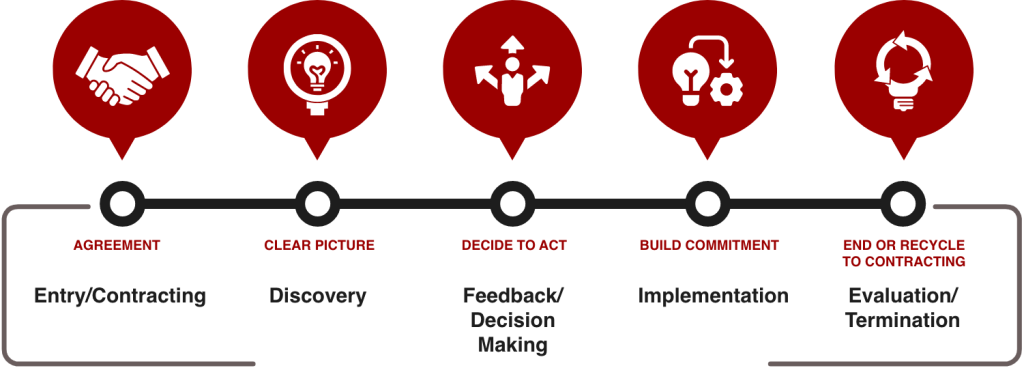When explaining Flawless Consulting to a friend outside of my regular consulting world, I like to highlight building authenticity and awareness in relationships. I want to highlight how Flawless Consulting and it’s structured framework lets work projects be approached differently and allows people to enter into projects more consciously. I appreciate these elements because they lead to a more effective project, with an opportunity for greater impact, by building the relationship along with technical expertise.
Yes, the Flawless Consulting® Workshop offers a consulting model for consultants to be better at what they do. But it is not only for consultants. It is for everyone. Why? Because everyone, regardless of their role, has the option of being more conscious of what work they are doing, why they are doing it, and how they are doing it.
Many times in an organizational setting, we are assigned to a project. We may be the leader or an individual contributor. The project kicks off, members of the team share introductions, they briefly clarify roles and outcomes and then they dive in. The work begins and continues without a pause. Sooner or later, some varying degree of issues or group dynamics inevitably rises to the surface. These issues span from the level of leader engagement to the project approach, project tactics, team roles, or external organizational influences. The list could go on. You have been there, right?

The Goal of Flawless Consulting
The purpose of the Flawless Consulting Workshop is to slow down. It asks you at the beginning of a project to define the type of relationship you want. This helps you better navigate the work and discover more about why the work is being requested. Organizations constantly deal with competing priorities and an endless list of projects that urgently need to get done.
The Flawless Consulting Model helps project leaders think through the original ask to ensure that it is the right ask and the right approach.
This is where authentic dialogue and strong relationships come in handy. It is also what the workshop helps you practice. In the end, your client (your boss, manager, or peer) is thankful because they now have more information they need to proceed. This saves organizations time and money, which is never arguable. It also builds trust, one conversation at a time. This ultimately contributes to the type of culture that enables employees to thrive.
Flawless Consulting is for Everyone
On the surface, yes, this training might look and feel like something strictly for consultants. In fact, it really is for everyone! After learning and practicing the concepts, you will leave refreshed and ready to go back to your current organizational challenge with new ideas and ways of being.
When I tell friends about this training, they always seem intrigued. In some sense, I think everyone can relate. They like the idea of forming deeper relationships and doing more meaningful work. I’m grateful to help build this capability inside of organizations. I also look forward to continuing to share these core concepts from Peter Block. If you’d like to know more about how this training could help your particular organization, please reach out to us!
